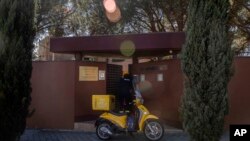North Korea has called a daylight raid on its Madrid embassy in February a “grave terrorist attack” and called for a full investigation into the incident that took place the week preceding the second summit between its leader, Kim Jong Un, and U.S. President Donald Trump.
The North’s comments about the raid on its Spanish diplomatic mission came more than a month after the February 22 incident as details from the official investigation began emerging.
One possible reason for Pyongyang’s late response was that North Korea was conducting its own investigation into the matter and trying to determine what happened, said Daniel Pinkston, a lecturer of international relations at Troy University in Seoul.
“The decision-making process takes some time in North Korea and has to rise up to the senior levels in a case like this. So I think that's why it took some time,” he said.
Park Won-gon, Dean of International Affairs at Handong Global University, added that the timing of the Hanoi summit may have also factored in Pyongyang's decision not to mention it sooner.
“After failing to reach an agreement in Hanoi, North Korea has received pressure from the U.S., so they’re now raising the issue or appealing to the U.S. [because of the perpetrators’ alleged contact with the Federal Bureau of Investigation],” he said.
The Spanish government has identified 10 people who allegedly raided the embassy, linking them to Cheollima Civil Defense, also known as Free Joseon. It’s a dissident organization that characterizes itself as a government-in-exile and dedicated to liberating North Korea.
Adrian Hong has been alleged by authorities to be the leader of Cheollima Civil Defense and the individual who led the group which entered the Madrid embassy.
Hong was a founding member of Liberty in North Korea (LiNK), a non-profit organization that helps North Koreans to defect, but currently serves as managing director of Pegasus Strategies. According to LiNK, Hong hasn’t been involved with the organization for several years.
Spain has issued at least two international arrest warrants for suspects in the raid.
The raid’s effect on denuclearization talks
Whatever the reason for the delayed public acknowledgment of the embassy incursion, Pinkston said the actions of Cheollima does not help denuclearization talks between North Korea and the United States.
However, when speaking to members of his cabinet Monday, South Korean President Moon Jae-in remained optimistic that the process would continue in a positive direction.
“Both the United States and North Korea are demonstrating their willingness to continue the dialogue by managing the situation in order to prevent the tensions from escalating to the level of the past. In the midst of it all, my upcoming visit to the United States will take place as a result of the ROK-U.S. joint efforts to revive the momentum for dialogue in the near future,” Moon said using South Korea’s formal English acronym, the Republic of Korea.
Moon also took issue with those seeking to derail the process he began nearly a year ago with the first inter-Korean summit.
“In some quarters,” Moon said, “there have been certain attempts to drive a wedge between Seoul and Washington and reverse the tide of peace on the Korean Peninsula.”
“Such attempts can be labeled truly irresponsible, especially when we recall the state of crisis we endured before dialogue was launched. If the ongoing dialogue ends in failure, the situation will deteriorate even further,” he warned, adding that such actions were in “no way helpful to our national interest or the future of the Korean Peninsula.”
Moon visits Washington April 10
Next week, Moon will meet President Trump in Washington. There he plans to “engage in in-depth discussions with President Trump on how we can work together to advance the peace process on the Korean Peninsula.”
This includes resuming talks between Pyongyang and Washington and moving toward the complete denuclearization of the Korean Peninsula, and “the creation of a virtuous cycle of inter-Korean and U.S.-North Korea relations.”
Pinkston currently sees divergent interests between Washington and Pyongyang and says it will be difficult moving forward.
Denuclearization should be sequenced and structured to bring about a result “mutually agreeable and beneficial to both sides,” said Pinkston.
“But that said, for it to be acceptable to the United States and its allies, it would require verified abandonment of North Korea's nuclear weapons and nuclear capability,” he said.
Ultimately, the complete denuclearization of North Korea will be a complicated and long process, according to Pinkston.
“That would require a change in the world view of the North Korean leadership… but I don't see any sign that North Korea is prepared to do that, certainly under the present conditions,” he added.
Jung Dae-jin, a research professor with the Ajou Institute of Unification, said North Korea may now be exercising a form of “strategic patience.”
He said that North Korea may be going through a “cooling-off” period following the Hanoi summit and may be ready to resume talks following the anniversary of the first inter-Korean summit on April 27.
Lee Ju-hyun contributed to this report.





